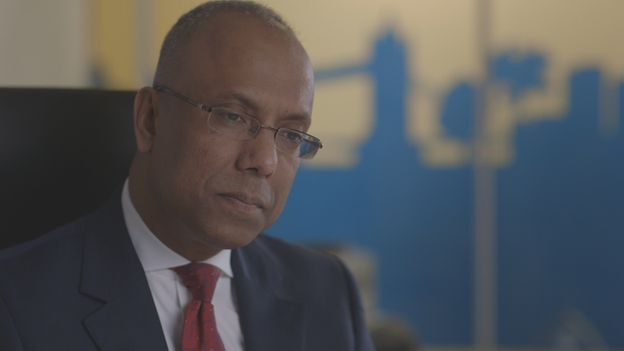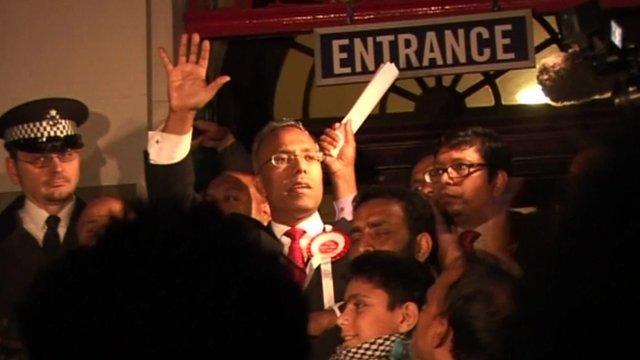London borough of Tower Hamlets could face inspection
- Published
Lutfur Rahman, the Bangladeshi mayor of Tower Hamlets, was first elected in 2010
Communities Secretary Eric Pickles has said he may send in inspectors to investigate a London borough.
Panorama has found that Lutfur Rahman, the Bangladeshi mayor of Tower Hamlets, has more than doubled funding recommended by officers for Bengali-run charities.
Opposition councillors say they believe the grants were made in return for electoral support.
Mr Rahman categorically denies the accusation.
In 2010, residents of Tower Hamlets voted in Britain's first directly elected Asian mayor.
Mr Rahman won as an independent with only 13% of registered voters.
Almost two-thirds of those who turned out to vote that day were from his own Bangladeshi community.
To win re-election in May, the mayor is expected to need a high Bangladeshi turnout again.
As a directly-elected mayor, he has executive power over the allocation of some grants to local bodies. Council officers made recommendations to the mayor based on the neediest in the borough.
Labour and Conservative opposition councillors allege that his selection of charities for grant funding in the run-up to the election was motivated by electoral advantage.
"I am pretty sure there is some quid pro quo in some of those grants decisions being made," said Labour councillor, Joshua Peck.
"Part of that is about supporting the mayor politically on the ground in the run-up to the election.

Almost two-thirds of the votes cast in 2010 were from Lutfur Rahman's own Bangladeshi community
"He doesn't have a political machine and he needs organisations… making sure the electorate turns out to vote for him."
The mayor strongly denies this but if his selection of which groups to fund was based on who he thought would get him votes, that would be unlawful.
Panorama has gained access to confidential paperwork that reveals the extent to which the mayor rejected recommendations from council officers.
They had proposed that Bengali and Somali groups receive £1.5m. But a review by Panorama of 362 grants approved by the mayor found that he increased funding to these organisations by nearly two-and-a-half times - to £3.6m.
To pay for it he used funds from the council's reserves and reduced what was left for other organisations by 25% overall.
The mayor categorically denied his allocation of grants was motivated by electoral advantage.
"It's absolutely untrue", he said. "My principle has all along been that we will distribute the money to as many organisations as possible… because they benefit the community."
In exchange for more personal power, directly elected mayors are expected to present themselves for questioning.
The mayor said he upholds the "highest standards of probity and transparency" and that the decisions have an "adequate audit trail".
But Mr Rahman declined to answer opposition questions in council meetings about his award of grants or answer questions from the special council forum that is meant to hold him to account, the Overview and Scrutiny (O&S) committee, for more than a year.
The confidential council papers provide only the barest explanation for the hundreds of changes made by the mayor to officer recommendations.
The changes were described as being based on "local knowledge" and because it was "known where money needs to be redistributed".
Mr Rahman said the grants decisions were properly scrutinised.
"Three grants panels, four cabinet meetings, two O&S meetings [were attended] about the grants - a vigorous process - after which I made the final decision," he said.
"My executive members attended [two overview and scrutiny committees and] answered each and every question and gave a proper answer."
Since he became mayor, Mr Rahman has changed the grants process from one held mostly in public to one which now takes place mostly behind closed doors.
Rob Whiteman, chief executive of the Chartered Institute of Public Finance and Accountancy, told Panorama: "It's very important that the process isn't behind closed doors.
"When it is, it calls into question whether or not that process is being properly followed and whether or not the decisions are being soundly made.
"Up and down the land you will see councils very keen to ensure that their decision making in this regard, in these areas, is very much in public."
Panorama took the findings to the Secretary of State for Communities and Local Government, Eric Pickles.
"Panorama has unearthed some very serious allegations that demand an answer," he said. "I think the allegations or questions that Panorama raise are of a completely different magnitude to worries and concerns that I have with other councils."
He said he would ask his experts to review Panorama's analysis in detail and added: "If I feel the allegations that you made are substantial and serious, I will actively consider intervening.
"I have powers to put in an inspector to look at the way that the council's been run."
Panorama: The Mayor and Our Money, BBC One, Monday 31 March at 20:30 GMT and then available in the UK on the BBC iPlayer.
- Published31 March 2014

- Published22 October 2010